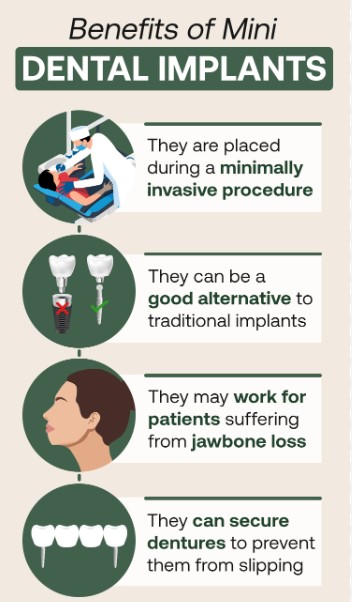How Much Do Mini Dental Implants Cost? Explore Benefits And Considerations

Welcome to the world of mini dental implants! If you are looking to replace missing or damaged teeth, you may have heard of mini dental implants as a possible option. Have you considered their cost and potential benefits?
In this article, we will explore the cost of mini dental implants, the types available, insurance coverage, and how they compare to traditional dental implants. We’ll also discuss considerations for choosing mini dental implants, so you can make the best decision for your dental health.
Let’s get started!
What are Mini Dental Implants?
You may have heard of mini dental implants, but do you know what they are and how they can help you? Mini dental implants (MDI) are a type of dental implant that is much smaller than traditional dental implants. MDIs are typically made of titanium and are surgically inserted into the jawbone to replace missing teeth.
They provide a stable foundation for artificial teeth, such as crowns, bridges, and dentures, and can be used to replace a single tooth or multiple teeth. MDIs are a great option if you’re looking for a less invasive and more affordable dental implant solution. They also offer many advantages over traditional dental implants, such as faster healing time, less discomfort, and easier placement.
However, it’s important to consider the potential risks and costs associated with MDIs before making a decision.
Benefits of Mini Dental Implants
Investing in mini dental implants can bring a host of advantages, so you’ll want to take a closer look at them. These implants can help you restore your smile while providing a more secure fit than traditional dentures.
Mini dental implants are smaller in size than traditional implants, making them an ideal choice for those with smaller mouths. Additionally, they’re placed with a minimally-invasive procedure, reducing the risk of post-operative complications. The cost of mini dental implants is also typically lower than other more traditional options.
Mini dental implants can also make it easier to eat and speak, while providing a more natural look and feel. They can be used to replace a single tooth or multiple teeth, depending on the patient’s needs. Additionally, they can help to prevent bone loss in the jaw area and maintain the shape of the face.
Mini dental implants are also a great option for those who have difficulty wearing traditional dentures due to a lack of bone density. Overall, mini dental implants can be an excellent choice for those who want a secure, natural smile without the high cost of traditional dental implants.
Types of Mini Dental Implants
Discover the different types of mini dental implants available, and the considerations that come with each, to find the one that’s right for you.
Mini dental implants, also known as MDIs, have revolutionized the process of replacing missing teeth. MDIs come in two types: root form and plate form.
Root form MDIs are titanium screws that are inserted into the jawbone to provide a secure foundation for crowns, bridges, and dentures. Plate form MDIs are thin metal plates that are inserted into the jawbone and can hold a row of several teeth.
The type of mini dental implant you select will depend on the number of teeth you need to replace, the condition of your jawbone, and other factors. Root form MDIs are more secure, but may require more extensive surgery than plate form MDIs. Plate form MDIs may be a better choice for people with weaker jawbones, or who don’t want to undergo a surgical procedure.
In either case, your dentist will be able to advise you on the most suitable type of MDI for your particular needs.
Factors Affecting Mini Dental Implant Costs
Knowing the factors that affect mini dental implant costs can help you make an informed decision about investing in this tooth replacement option.
The cost of mini dental implants can vary depending on several factors, including:
- The number of teeth being replaced
- Materials used for the implants
- The expertise of the dentist performing the procedure
The cost of mini dental implants can be higher if multiple teeth need to be replaced or if more expensive materials are used to create the implant. Additionally, if you choose a dentist with more experience and expertise in the field, the cost may be higher.
It’s important to consider all the factors that affect the cost of mini dental implants before deciding to invest in this procedure. Doing research on the dentist and materials used can help you ensure you’re making the best decision for your situation.
Cost of Mini Dental Implants
Considering mini dental implants as an option for tooth replacement can be cost-effective, so it’s important to evaluate the various factors that affect the cost.
The cost of mini dental implants varies depending on the type and number of implants needed, as well as the complexity of the procedure. On average, each mini dental implant can range from $500 to $2000, depending on the area of the mouth and the individual’s dental health.
In addition to the cost of the implant itself, there are also the associated fees for the procedure which can include the cost of anesthesia, X-rays, and follow-up appointments. Furthermore, the cost of the mini dental implants may also include the cost of the abutment and crown, which can range from $500 to $1000.
It is important to note that mini dental implants may not be covered by insurance, so it’s important to check with your insurer before proceeding.
Ultimately, the cost of mini dental implants can be significantly less than that of traditional implants, making them a cost-effective option for many people.
Insurance Coverage for Mini Dental Implants
Many insurance companies don’t cover the cost of mini dental implants, so it’s important to check with your insurer before proceeding. This will help you determine if any of the associated fees will be covered.
It’s important to note that even if your insurance company doesn’t cover the cost of the implants, they may cover the cost of the associated procedures. This includes procedures such as the extraction of the damaged tooth or the placement of the implant.
Additionally, some insurance companies may offer discounts for certain procedures. So, it’s worth asking about any potential discounts that may be available.
It’s also important to consider the long-term costs associated with mini dental implants. While insurance may cover the initial cost of the implants, you may still be responsible for the cost of follow-up visits and any additional procedures that may be necessary.
Furthermore, you may need to purchase special products, such as a special toothbrush or floss, to ensure the implants remain in good condition. Therefore, it’s important to consider all of the associated costs before making a decision.
Mini Dental Implants vs. Traditional Dental Implants
Now that you know more about insurance coverage for mini dental implants, you may be wondering what the differences are between mini dental implants and traditional dental implants. Both are forms of implant dentistry, but there are some key differences to consider.
First, traditional implants are larger than mini dental implants and require a surgical procedure to be placed. Traditional implants also typically require a longer healing time, and they require a larger and more invasive surgical procedure.
On the other hand, mini dental implants are much smaller, and they can often be placed with a much less invasive surgical procedure. Mini dental implants also have a much shorter healing time and are often more affordable than traditional implants.
Here are a few key differences between mini dental implants and traditional dental implants:
- Traditional implants are larger and require a surgical procedure to be placed.
- Mini dental implants are much smaller and can be placed with a less invasive surgical procedure.
- Traditional implants generally require a longer healing time.
- Mini dental implants have a much shorter healing time.
- Mini dental implants are often more affordable than traditional implants.
Considering Mini Dental Implants
If you’re looking for a less invasive, more affordable, and quicker implant procedure, mini dental implants may be the perfect solution for you. Mini dental implants are approximately half the size of traditional dental implants, making them more suitable for smaller mouths or areas where there is limited jawbone structure.
The shorter procedure time and smaller incision size means that you can start enjoying your new smile with less discomfort and a quicker recovery.
The cost of mini dental implants varies depending on the number of implants needed, the type of restoration, and the location of the dentist. On average, mini dental implants cost around $2,000 to $3,000. This is significantly less than the cost of traditional dental implants, which range from $3,500 to $4,500.
Furthermore, mini dental implants are usually covered by dental insurance, making them even more affordable for many patients.
Conclusion
You’ve learned what mini dental implants are and the potential benefits they provide.
You’ve also explored the types of mini dental implants and the factors that affect their cost.
On average, mini dental implants can cost anywhere from $1,000 to $3,000. Insurance coverage can vary, but it’s worth looking into.
Lastly, you’ve seen that mini dental implants can be a great option when compared to traditional dental implants.
Ultimately, deciding whether mini dental implants are right for you is a decision best made between you and your dental care provider.
With the right information, you can make an informed decision and get the smile you’ve always wanted.









